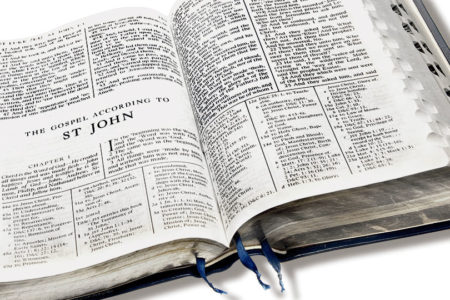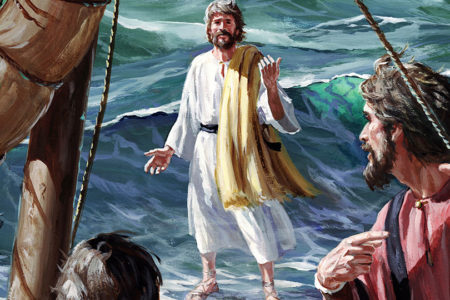The Divine Shepherd of Israel
When Jesus was born in Bethlehem, He entered a world that was bursting with anticipation. Some of the Jewish people were longing for God’s divine manifestation, as in the days of Moses and Solomon (Ex. 40:34–38; 1 Ki. 8:10–11). But they believed that before God’s presence would be evident, Israel’s Redeemer-Messiah must come, as the prophets promised.
The Gospel of John brings this belief to life by accentuating Jesus’ eternality and divinity as the promised Immanuel (“God with us”): “And the Word became flesh and dwelt among us, and we beheld His glory, the glory as of the only begotten of the Father, full of grace and truth” (Jn. 1:14). Jesus’ presence in the world was God’s presence on Earth.
In fact, the apostle John used a Greek word for “dwelt” in John 1:14 that is identical in meaning to a Hebrew word used in Exodus 40:35 to indicate the residing of God’s physical presence: “And Moses was not able to enter the tabernacle of meeting, because the cloud rested [dwelt] above it, and the glory of the Lᴏʀᴅ filled the tabernacle.”
When Jesus ministered to the Jewish people, He obeyed the Law perfectly and revealed the true nature of God’s holiness and character in His words and actions. People were able to experience genuine grace and truth when Jesus resided with them.
Sadly, through the ages the church has neglected to show the Jewish people the same grace and truth Jesus displayed toward them. Its long history of persecution, oppression, and anti-Semitism has blemished the heart of Jesus’ message to the nation of Israel and, consequently, to many others.
As a result, Jesus is frequently judged by the flawed actions of people and not by His own words and deeds. Yet He devoted every area of His life to the Jewish people. In grace He cared for them, and in truth He spoke to them.
A popular American author and leadership expert once said, “True leadership must be for the benefit of the followers, not the enrichment of the leaders.” Unfortunately, ancient Israel experienced exactly the opposite. Many of Israel’s leaders grew rich at the expense of ordinary citizens. Ezekiel 34 portrays these rulers as shepherds whom God promises to judge.
God had intended for them to lead His people by the standards of the Law, which He designed to benefit everyone: young and old, rich and poor, men and women.
However, many of Israel’s “shepherds” looked out for themselves and took advantage of the most vulnerable. So God indicted them: “The weak you have not strengthened, nor have you healed those who were sick, nor bound up the broken, nor brought back what was driven away, nor sought what was lost; but with force and cruelty you have ruled them” (v. 4).
In Jesus’ day, the judgment of Ezekiel 34 was read aloud in synagogues during the Hanukkah (Feast of Dedication) season as a reminder of the wicked Israelite leaders who permitted false gods, idols, and foreign kings to lead God’s people away from trusting in Him.
Jesus probably heard Ezekiel 34 read during Hanukkah. It was during the Feast of Dedication when He announced, “I am the good shepherd. The good shepherd gives His life for the sheep” (Jn. 10:11). He was the ruler they had been waiting for. He was the promised One who would live by the true nature of God’s Law, embodying true justice and righteousness, as promised by the prophets (Isa. 9:6–7).
Unlike a number of Israel’s past shepherds, Jesus was selfless and uninterested in personal gain. Rather, He came to be the sacrificial Shepherd who would give His life for His people.
The hungry, thirsty, sick, and poor all flocked to the One who sincerely cared for their physical welfare. Jesus’ response toward those who were suffering reflected the pure compassion of the Father poured out on His people.
Even in His own grief over the beheading of His cousin, John the Baptist, Jesus selflessly ministered to His people, providing for their needs.
When word came of John’s death, Jesus retreated to an isolated place, probably to pray, considering His own death was imminent. Yet He turned His attention toward a large crowd full of the sick and needy, healing them of their illnesses.
His disciples urged Him to send the crowds into town to buy something to eat for themselves. Instead, moved by compassion, Jesus performed a miracle and fed 5,000 men, plus women and children, by multiplying five loaves of bread and two fish (Mt. 14:14–21; Mk. 6:34–44).
The pharisees and scribes were the guardians and interpreters of the Law in Jesus’ day. In their zeal to keep people from breaking the Law, they manufactured extra laws that became a heavy burden for anyone desiring to worship God, doing more to push people away from the Lord, rather than drawing them near.
They heaped manmade law after manmade law on the Jewish people, reveling in the accolades and praise of men. They displayed their righteousness like fine clothing, praying and tithing publicly so that all could see their devotion to God. They demanded more of the people than the Law required, often for their own personal benefit, and neglected the true responsibility of “justice and mercy and faith” (Mt. 23:23).
Seeing these unnecessary demands burdening His people, Jesus declared, “Take My yoke upon you and learn from Me, for I am gentle and lowly in heart, and you will find rest for your souls. For My yoke is easy and My burden is light” (11:29–30). His desire was to reconnect His people to the true character of the Father through justice, mercy, and faith.
Through His sacrifice and resurrection, Jesus Himself became our High Priest, reconciling to the God of Abraham, Isaac, and Jacob those who trust in Him.
Jesus truly loved the Jewish people. Although He was frustrated with Israel’s failed leaders, He healed His people, taught them, and wept over them. He was the true Shepherd who cared for His flock and loved it to the end.
Someday He will return and rule over Israel and the world with perfect justice as the eternal King of glory.
The next time you’re tempted to judge Jesus by the blunders of the church, examine His life from the Scriptures and see the genuine Jesus. When you do, perhaps you’ll begin to see that He is the true, divine Shepherd who loves you.








Hi, what is your source for the statement that Ezek 34 was read at Hanukkah? Is this stated in Talmud, or some other Rabbinic source?